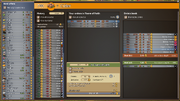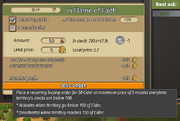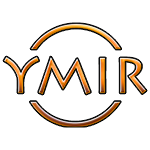Trading in Ymir refers more specifically to the trading of goods between territories, which can belong to the same State or not.
Trading is unlocked by the adoption of physical currencies with Barter followed by the development of Markets.
Trading is not to be confused with another type of resource exchange between territories that are regional transfers.
A Market building is necessary to trade, whose employed Merchants produce a Trading service that represents the work of exchanging offers and demands with distant trading partners and transporting goods there to honor orders.
[ | ]

The Trading menu is where trading actions are performed and monitored.
Access to the trading menus becomes possible once the required knowledge for Markets is acquired. It can be opened from any Resource menu, or from the resource tab of the right side panel when a controlled territory is selected.
This menu is where trading actions are performed and where players can also monitor their trading activities.
Orders book[ | ]
The order book on the right side shows all the available orders for the selected resource: selling orders (bids) and buying orders (asks). Only orders from States in the player's trading network are visible. This gives the player an overview of what the offer and demand is for a resource, and at which prices.
Territory's orders[ | ]
All the orders of the currently selected territory are visible in the center of the menu. These orders can be currently active (order is passed and offer is available to others) or inactive (conditions are not met, the order is sleeping).
Creating trade orders[ | ]

Ordering to buy automatically 50 units of apples if stocks go below 100 at a maximum price of 5.
The bottom of the center panel of the Trading menu is where new trading offers for the selected resource are created. These offers are relative to the current territory this menu was opened from. Once the order settings are defined, the player confirms it and if the required Trading service is available in the territory, the offer can become effective and be taken by other territories.
- select if it's a buy order or a sell order.
- select a resource amount to transact. Other parties do not have to fill the whole order: a sell order of 100 apples can be sold gradually in multiple operations by buyers.
- set a limit price. In a sell order, this is the minimum price the resource will be sold for. In a buy order it is the maximum price paid for it.
Internal only[ | ]
An order can be set to "internal only", meaning the trading offer will only be visible and available to territories of the same State (so other territories of the same player). This allows to organized trades internally between the player's regions.
Note that this does not apply to territories from other States (players) of the same Nation.
Recurrent orders[ | ]
An order can be set to be a "recurrent order". This will make the order automatically re-activate when conditions are met as by default, orders are only executed once and deleted when completed.
Conditions are stock based: the buy orders will activate when stocks in the territory go below the input value and the sell orders activate when stocks are above the input value.
Tips[ | ]
Orders and Storage Policies[ | ]
Something to be mindful of is what Storage Policy you have set for your resource when trading or doing Recurrent Orders. If you have a Resources storage policy set to:
- Only in Restricted, purchases made of this resource that would exceed what you can store are destroyed.
- No Stocking, purchases made of this resource are simply destroyed.
You may run into this issue if you switch from producing a resource to buying a resource off of the market.
